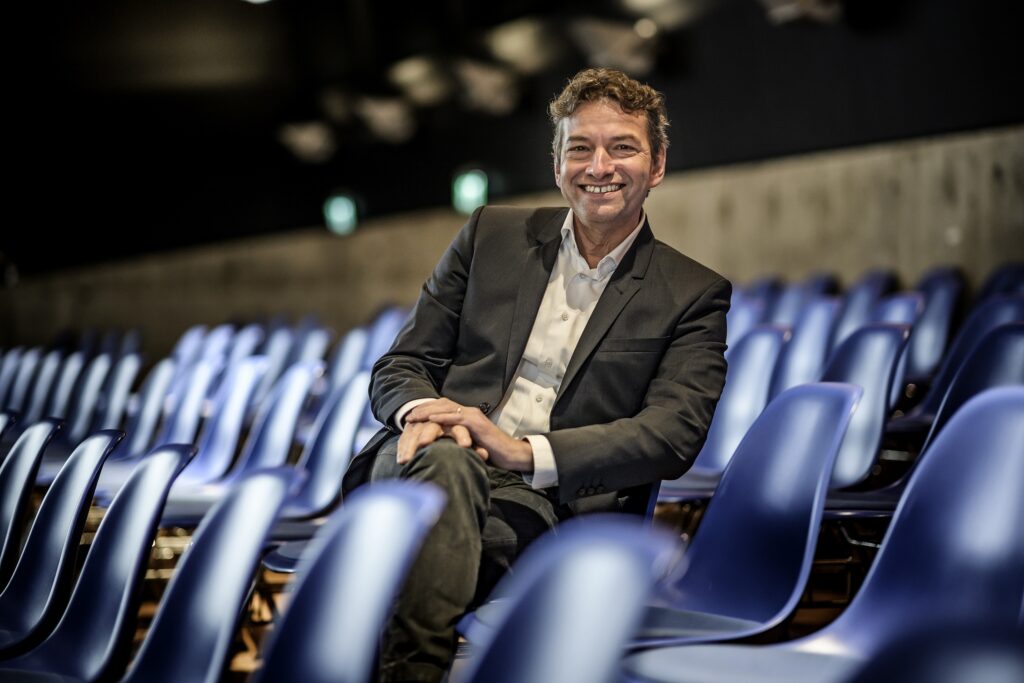Kaspar Zehnder: “Bach’s music is a universe. […] His music is a synthesis of intellectually thoughtful mastery and emotional energy”.
Interview with Kaspar Zehnder by Natalie Widmer (dramaturge at Theater Biel Solothurn TOBS) about the performances of the St. John Passion in Biel (April 7, 2022) and Bern (April 9, 2022).
“THE GRAVE IS NOT THE END”
Robert Schumann found the “little” St. John Passion much “bolder, more powerful and poetic” than the great one after Matthew, would you agree with him? What distinguishes the St. John Passion?
Bolder, more powerful, and more poetic is somewhat provocative in view of the dimension of the St. Matthew Passion, but Schumann is already correct: the St. John Passion is admittedly softer and more intimate at first glance than the one after St. Matthew, which can already be explained on the basis of the basic key of G minor and many other B-flat keys, while in the St. Matthew Passion E minor, B minor, and other cross keys are important. But the St. John Passion is also more dramatic in many places, for example during Pilate’s interrogation, where the individual recitatives and turbae choruses alternate very quickly. For the listener, this creates a maelstrom, a whirlpool of action that only gradually calms down with the completed crucifixion. In the last arias and the last two long recitatives, where John quotes the prophets from the Old Testament, the text becomes not only poetic but also philosophical, and then out of nowhere the final chorus in C minor, “Ruht wohl,” begins. But the grave is not the end. Bach lets another chorale follow: the soul enters the angels, and the divine majesty (E-flat major) lives in eternity.
The St. John Passion was Bach’s first major work for Leipzig, but it remained a kind of “permanent construction site”: four versions were created between 1724 and 1749. Which one will we hear tonight?
Bach reverted to the original version of 1724 for his last performance, but revised it once again. We play this last version that has survived in score and parts. It is the version usually played today. The second version from 1725 and the third version (around 1730) deviate relatively strongly from it.
The eight members of the English vocal ensemble “Solomon’s Knot” function both as soloists and as a choir. How did this collaboration come about?
Three years ago we performed the St. Matthew Passion with a lush instrumentation appropriate to the work, and at that time I harbored the desire to program a very small-scale St. John Passion as a contrast. Solomon’s Knot is one of the first addresses for this, but the ensemble only calls itself that without a conductor. The fact that it accepts me as director of the performance is an honor for me and certainly a sign of our artistic friendship.
Why did you decide to put the St. John Passion on the program? Or to put it another way: What does this work still have to say to us today?
Oratorios, like operas, are full-length works that have been composed over a long period of time by a composer. Unlike a mass, which has a given text, or an instrumental commissioned work, an oratorio follows a content that is sacred but freer in its narrative style. I have performed five such oratorios during my time at TOBS, Ein Deutsches Requiem by Brahms on freely composed biblical texts, Handel’s Messiah – the life of Jesus from birth to resurrection, also freely composed from biblical passages in the Old and New Testaments – and by Bach the Christmas Oratorio and the two Passions. One would perhaps continue the list with the great oratorios of Haydn or Mendelssohn.
Sacred music has had a meaning for me since early childhood. In oratorio performances, where my mother was a soloist, I was able to experience music and concert at first hand. At that time, it was the large apparatus that fascinated me, or the role of the conductor who has to hold it all together and is allowed to control it. Today, I am interested above all in the spirituality, which I feel particularly well in Bach as a German speaker who grew up in a Reformed culture. Bach is a universe with which coming into contact is an experience for performers and listeners alike. His music – and Bach, unlike all other composers, wrote nothing bad or less successful – is a synthesis of intellectually thoughtful mastery and emotional energy. We never understand everything, we can analyse, we can learn a lifetime, but we feel picked up from the beginning, we are touched, regardless of space, time and place.
Interview: Natalie Widmer (dramaturge at Theater Biel Solothurn TOBS)
